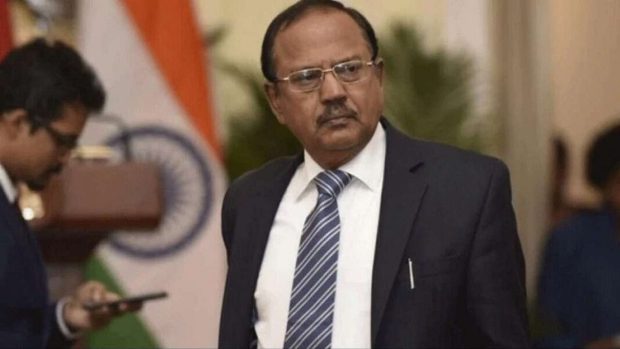India pushes TNA towards economic development issues
By P. K. Balachandran
COLOMBO – India’s National Security Adviser, Ajit Doval, and the leader of the Tamil National Alliance (TNA), R. Sampanthan, during a brief meeting on Sunday (29), talked about the economic development of Sri Lanka, including the Tamil-speaking North and East in the background of the contemporary health-related challenges, the Indian High Commission said in a brief statement.
But details of the development programs discussed were not given in the official release, nor was there any indication that the reported bid by the Gotabaya Rajapaksa government to repeal the 13th Amendment to the Constitution (13A), which gives the provinces a modicum of autonomy, had come up during the talks.
However, political sources told Daily Express that the 13A case was discussed, but that both sides had agreed to keep it under wraps given the political sensitivities about the matter in Sri Lanka.
It is obvious that India is keener on the economic development of the Northern and Eastern Provinces, given the difficulties in persuading a sovereign government to yield to foreign pressure on domestic political issues like the constitution and devolution of power.
On an earlier visit to Colombo, the present Indian Foreign Minister, Dr. S. Jaishankar, had told TNA leaders that they should raise development issues while demanding devolution of power and not hold development hostage to political goals.
The need for economic development in the war-affected Northern and Eastern Provinces cannot be over-emphasized. The Tamils had a chance to develop the Northern Province when the TNA was in power there for a full term. But the Provincial Council headed by the Alliance’s Chief Minister C. V. Wigneswaran, cared little for development saying a political solution based on maximum autonomy should come first.
“Putting development before a political solution is arrived at is like putting the cart before the horse,” Wigneswaran used to say.
The provincial administration under Wigneswaran used to send back, unspent, a good deal of the developmental funds given by the central government in Colombo. The Chief Minister’s plea was that the developmental plans sought to be funded by the centre, were not chalked out with the consent of the provincial council.
Doval might only have been partially interested in discussing the fate of the 13th Amendment because India’s concerns and priorities have changed over time with changes in geopolitics brought about by China’s ingress into Sri Lanka. But Sampanthan would certainly have raised the issue as it is of great concern to the Tamils, who also insist that having acted as a midwife in the birth of the 13A through the India-Lanka Accord of 1987, India has a moral responsibility to see that it remains in the statute book.
Furthermore, the Tamils are hanging on to a joint statement issued after the last Modi-Gotabaya Rajapaksa talks in New Delhi which said: “Prime Minister Modi called on the Government of Sri Lanka to address the aspirations of the Tamil people for equality, justice, peace and respect within a united Sri Lanka, including by carrying forward the process of reconciliation with the implementation of the 13th Amendment to the Constitution.”
The Tamil minority genuinely fears the Sinhala-nationalist Gotabaya Rajapaksa government will repeal the 13A since it is seen as being a divisive system. In the view of the Sinhala majority, with whose overwhelming support the Rajapaksas came to power, provincial autonomy is nothing but a stepping stone to secession. In fact, the present Prime Minister, Mahinda Rajapaksa, had once said he would not allow the Tamils to get at the negotiating table what they could not get by waging war – namely a separate independent ‘Tamil Eelam’ in the North and East.
However, it is noteworthy that during his presidency, Mahinda Rajapaksa did not abolish the 13A. As he once explained, the Sinhala political class had begun to see the provincial councils as avenues of political mobility and therefore, they could not be wished away. The provincial councils were in-between the local Pradeshiya Sabhas and the national Parliament, a political stepping stone as it were. As provincial councillors and ministers, politicians get to enjoy official power, political clout and prestige, which they would loathe to give up.
But the Tamils fear that President Gotabaya Rajapaksa is a different kettle of fish who will take drastic measures. He is a military man, a former Lt. Colonel, with very definitive views on issues. To add to the Tamils’ anxieties, the president appointed Adm. Rtd. Sarath Weerasekara, a known opponent of the 13A and provincial councils, as Minister of Provincial Councils. And Adm. Weerasekara has been firing salvos at the provincial council-system describing them as bottlenecks and a drain on the country’s scarce financial resources.
However, many believe President Gotabaya will not abolish the 13A and that the appointment of Adm. Weerasekara as Minister of Provincial Councils and the licence given to him to denounce the 13A, are meant to keep his Sinhala nationalist constituency happy. According to the Colombo-based leader of the Indian Origin Tamils, Mano Ganeshan, the Sinhalese may not want democracy for the Tamils, but they certainly want it for themselves. Therefore the provincial councils will remain.
If the government was keen on abolishing the provincial councils, it would not have allocated a huge amount of money to the Ministry of Provincial Councils and Local Government in the 2021 budget. The nine provincial councils have been allocated a total of over Rs 338 billion, of which around Rs 279 billion will go towards recurrent expenditure and around Rs 58 billion towards capital expenditure. The provincial councils are among the top recipients of budgeted funds.
India would like the TNA to cooperate with the Sri Lankan government to make the maximum use of the funds allocated to develop the Tamil-speaking Northern and Eastern provinces.
-P K. Balachandran is a senior Colombo-based journalist who in the past two decades, has reported for The Hindustan Times, The New Indian Express and the Economist


